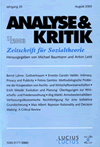Funktionalismus

2002 (24) Issue 1
Editorial
Vor gut 50 Jahren wurde die amerikanische Soziologie fast vollständig von T. Parsons' Programm des 'strukturellen Funktionalismus' dominiert. Erst in den 1960er Jahren begann das strukturfunktionale Programm an Einfluss zu verlieren, als seine auf Bestanderhalt und Stabilität ausgerichtete Grundidee mit der sich rapide verändernden Gesellschaft des sich verschärfenden Vietnamkriegs, der black-power-Bewegung und der Studentenrevolte in zunehmenden Widerspruch geriet. Starke Armut und einseiti...
Table of Contents
Title: Der Niedergang des Strukturfunktionalismus und der Aufstieg paradigmatischer Alternativen in der Ethnologie
Author: Jürg Helbling
Page: 3-39
Abstract: The paper explores the main paradigmatic failures of structural functionalism in anthropology. Structural functionalism explains institutions and social behavior by their contribution to the reproduction of social structure. Starting from Radcliffe-Brown and Malinowski, who represent two main variants of functionalism in anthropology, its main paradigmatic problems are discussed: its inability to analyze social conflict and change, its reducing of society to norms and values as well as its mode of explaining social facts. These failures are illustrated by two functional theories of tribal wars, by Evans-Pritchard and by Rappaport. Various theoretical alternatives emerge from the decline of functionalism in anthropology. Conflict theory as well as game theory, new institutionalism, theories of collective action and evolutionary economics represent true alternatives. This again is illustrated by a theory of tribal war, explaining cooperation both within local groups and between allies against the background of the warlike social environment in which local groups are interacting.
Title: Functionalist Socialization, Family and Character
Author: Gerry Mackie
Page: 40-59
Abstract: According to functionalism, the family internalizes and transmits society's supposed value consensus from one generation to the next, and such socialization explains morality, social order, and cultural uniformities. I present three investigations that challenge the concept of functionalist socialization, and propose alternative theories that may better explain observations. First, I present evidence from developmental psychology based largely on American subjects and an ethnographic report from Burkina Faso which suggest that the characters of children are not formed by parental socialization. Second, I report data from Europe which suggest that the weaker is family and its supervision, the stronger is character and internalized morality. Third, I report an account of European modernization which suggests that weaker family ties broaden extrafamilial associations and generalize moral orientation. Finally, I suggest that Schelling's game-theoretic account of social conventions is a better explanation of cultural continuities and discontinuities than is functionalism.
Title: Functionalist Successes and Excesses in the Social Sciences
Author: Harold Kincaid
Page: 60-71
Abstract: This paper presents a model of functional explanations as a species of ordinary causal explanation and argues that they are widespread for understandable reasons in the social sciences. The remainder of the paper then looks at specific functional explanations in the social research and examines the prospects and problems for those accounts.
Title: Social Selection, Agents, Intentions, and Functional Explanation
Author: K. Brad Wray
Page: 72-86
Abstract: Jon Elster and Daniel Little have criticized social scientists for appealing to a mechanism of social selection in functional explanations of social practices. Both believe that there is no such mechanism operative in the social world. I develop and defend an account of functional explanation in which a mechanism of social selection figures centrally. In addition to developing an account of social selection, I clarify what functional hypotheses purport to claim, and re-examine the role of agents, intentions in functional explanations in an effort to show why a mechanism of social selection is indispensable to adequate functional explanations.
Title: Individualism and Holism in the Social Sciences
Author: Michael Bradie
Page: 87-99
Abstract: Harold Kincaid's 'Individualism and the Unity of Science' is a subtle and nuanced analysis of the interlocking themes and issues surrounding the struggle between 'holists' and 'individualists' in the social sciences. Two major claims, one substantial and one methodological, emerge from this analysis. The substantial claim is a defence of a 'non-reductive unity' of the sciences. The methodological claim is that the disputes between reductionists and pluralists or between individualists and holists are empirical and not conceptual disputes. In this paper, I focus on what I take to be Kincaid's central theses.
Title: Zum Begriff nicht-mathematischer Funktionen
Author: Birgit Samson / Wolfgang Detel
Page: 100-129
Abstract: roceeding from a set of conditions that an adequate notion of a non-mathematical function should satisfy, we examine some of the most influential of these notions, including Cummins-functions, to conclude that the teleosemantic notion of a non-mathematical proper function, suggested originally by Ruth Millikan, best satisfies the proposed conditions. In particular, this notion allows us to talk consistently about organisms having some functions while operating, at the same time, dysfunctionally. In addition, we show that the teleosemantic notion of relational and adaptive proper functions can be applied to singular events being part of developments in evolution and learning processes. We conclude that it is in this framework, rather than on the basis of the so-called theory of memes, that an application of the teleosemantic notion of a proper function to social areas can be seriously considered.
Title: On Having a Function and Having a Good
Author: Peter McLaughlin
Page: 130-143
Abstract: One result of recent discussions on the notion of function is that the appeal to the function of something in order to explain why it is there and what it is, presupposes (willingly or not) that some system particularly relevant to the function bearer has a good. Some recent analyses of what it means to have a good trace having a good back to having a function. Two such attempts are examined and compared to a more traditional analysis. An anachronistic version of Aristotle, involving the self-production of the beneficiary, s recommended as a better starting point for a naturalistic reconstruction of the subject of benefit.